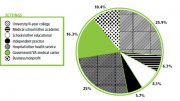 According to a new study conducted by health economists at the University of East Anglia and the Centre for Diet and Activity Research in the UK, walking or cycling to work is better for people's mental health than driving.
According to a new study conducted by health economists at the University of East Anglia and the Centre for Diet and Activity Research in the UK, walking or cycling to work is better for people's mental health than driving.
The psychological benefits of walking or cycling to work come on top of the well-known physical health benefits.
In February of this year, the UK Office of National Statistics published a report that found UK citizens who walked to work had lower life satisfaction than those who drove to work. The report also found that cyclists were less happy and more anxious than other commuters.
The new study, however - which is published in the journal Preventive Medicine - contradicts this.
The team studied 18 years of data from almost 18, 000 commuters in the UK aged 18-65. The data took in various aspects of psychological health including feelings of worthlessness, unhappiness, sleepless nights and capability of dealing with problems.
Factors that are known to affect well-being, such as income, having children, moving house or job, and relationship changes were also taken into account by the researchers.
The results suggest that people benefited from improved well-being when they stopped driving and started walking or cycling to work. Commuters reported that they felt better able to concentrate and "less under strain" if they used these methods of travel, rather than driving a car.
The researchers also point out that these psychological benefits come on top of the well-known physical health benefits associated with walking and cycling.
Even traveling on public transport was associated with greater psychological well-being than driving.
University of East Anglia's Adam Martin, who was lead researcher on the study, says:
"One surprising finding was that commuters reported feeling better when traveling by public transport, compared to driving. You might think that things like disruption to services or crowds of commuters might have been a cause of considerable stress. But as buses or trains also give people time to relax, read, socialize, and there is usually an associated walk to the bus stop or railway station, it appears to cheer people up."
Commute time was also demonstrated to be an important factor of psychological well-being. "Our study shows that the longer people spend commuting in cars, the worse their psychological well-being, " says Martin. "And correspondingly, people feel better when they have a longer walk to work."
Last month, another study from the UK, published in the BMJ, found that the health benefits of walking or cycling to work are also experienced by people who commute to work by public transport.
Source: www.medicalnewstoday.com
You might also like:

|
A review of radical behaviorism for ABA practitioners by James M. Johnston.(applied behavioral analysis)(Book review): An article from: The Psychological Record Book (The Psychological Record) |
|
|
Confidentiality with minors: mental health counselors' attitudes toward breaching or preserving confidentiality.: An article from: Journal of Mental Health Counseling Book (American Mental Health Counselors Association) |















This is quite a question that requires serious thought.
It should mean having a healthy mental and emotional capacity that allows you to deal effectively with life's challenges.
This would include the knowledge and wisdom to make effective decisions, values that promote self-actualization, the emotional stability to accept challenges, to take responsibility, and to learn from one's mistakes. Psychological health also includes the ability to form and maintain positive relationships with others, and to treat living beings with respect.
It should mean having a healthy mental and emotional capacity that allows you to deal effectively with life's challenges.
This would include the knowledge and wisdom to make effective decisions, values that promote self-actualization, the emotional stability to accept challenges, to take responsibility, and to learn from one's mistakes. Psychological health also includes the ability to form and maintain positive relationships with others, and to treat living beings with respect.